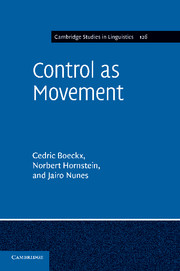Book contents
- Frontmatter
- Contents
- Acknowledgments
- 1 Introduction
- 2 Some historical background
- 3 Basic properties of the movement theory of control
- 4 Empirical advantages
- 5 Empirical challenges and solutions
- 6 On non-obligatory control
- 7 Some notes on semantic approaches to control
- 8 The movement theory of control and the minimalist program
- References
- Index
1 - Introduction
Published online by Cambridge University Press: 07 September 2010
- Frontmatter
- Contents
- Acknowledgments
- 1 Introduction
- 2 Some historical background
- 3 Basic properties of the movement theory of control
- 4 Empirical advantages
- 5 Empirical challenges and solutions
- 6 On non-obligatory control
- 7 Some notes on semantic approaches to control
- 8 The movement theory of control and the minimalist program
- References
- Index
Summary
In the following pages we develop an extended argument for a proposal whose conceptual simplicity and empirical success will, we trust, be evident to all readers. The proposal says that (obligatory) control is movement, more specifically, A-movement. We propose that the phenomena that have been used to motivate a special and separate control construction are best explained if control is treated as an A-movement dependency, on a par with other phenomena that have been traditionally treated in terms of A-movement such as passive, raising, and (local) scrambling. Put another way, we claim that maintaining the constructional specificity of control (in whatever form, be it in terms of the PRO theorem [e.g., Chomsky 1981], null case [e.g., Chomsky and Lasnik 1993; Martin 1996; and Bošković 1997], or ad hoc “anaphoric” tense-agreement dependencies [e.g., Landau 1999, 2000, 2004]) significantly hampers our understanding of the phenomenon as it leads to explanations that are roughly as complex as the phenomenon itself.
Despite virtues that we believe are transparent (see e.g., Hornstein 1999, 2001), the movement theory of control (hereafter, MTC) has proven to be quite controversial. We believe that there are several reasons for this. The first one is historical. Differentiating raising from control in terms of movement has been a fixed point within generative grammar from the earliest accounts within the standard theory to current versions of minimalism (see Davies and Dubinsky 2004).
- Type
- Chapter
- Information
- Control as Movement , pp. 1 - 4Publisher: Cambridge University PressPrint publication year: 2010



